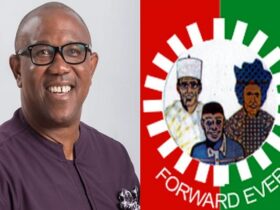As the curtain falls on 2024 in a matter of days, there were major events and key moments that Nigerians and global citizens would agree defined the year.
On the local scene some Nigerians believe that 2024 offered more not-so-pleasant memories, with little to cheer about amidst the soaring cost of living occasioned by major economic reforms.
Others, however, enthused that the forgettable happenings of the going year point to a fresh and positive anticipation of the coming year.
On the foreign arena, major global events also highlighted 2024; some regarded as significant to the international balance of power. We review some of them:
Mixed start: Disasters, killings and rescues
The year started with some sad events. There were mishaps, such as the one that claimed 20 lives after two passenger boats, each carrying 16 passengers, capsized after colliding in Lagos.
Also, eight people initially died and 100 others were reported missing after a boat capsized along the boundary of Niger and Kebbi states.
Two people were killed and 77 others injured during a blast caused by explosives stored for use in illegal mining operations in Ibadan.
Kidnapping and terrorist activities also heightened at the beginning of the year, with more than 200 pupils and a teacher kidnapped in the town of Kuriga, Chikun Local Government Area, Kaduna State.
At least 40 people were also killed in an attack on the village of Zurak in Wase, Plateau State.
However, it wasn’t all doom and gloom, as security forces made some significant rescues and fought tooth and nail to restore security across the country.
For instance, the Nigerian Army and local vigilante groups rescued 14 people from kidnappers in Katsina State. Authorities also rescued 350 Boko Haram hostages in the Sambisa Forest in Borno.
Return to Nigeria, We Hail Thee!
As part of activities to mark the first anniversary of President Bola Tinubu, the country, through an act of parliament, re-adopted Nigeria, We Hail Thee, which was the country’s national anthem from 1960 to 1978.
President Tinubu signed the bill into law to revert to Nigeria’s old national anthem, replacing Arise, O Compatriots introduced by the military government in 1978.
The President said the anthem symbolised Nigeria’s diversity, but some Nigerians expressed outrage that the process of changing the national anthem was abrupt without the contributions of stakeholders, including the people.
Labour, government squabble over new minimum wage
On June 3, 2024, workers downed tools across the country as the Nigeria Labour Congress (NLC) and the Trade Union Congress (TUC) began their industrial action.
The strike was over an exponential rate of increase in electricity tariff and a lack of agreement on a new minimum wage.
The effect was the shutdown of businesses and critical services across the country including financial institutions, schools, hospitals, and energy installations, as workers complied with the directive.
However, after prolonged negotiations, Organised Labour and the Nigerian government agreed on a new minimum wage of ₦70,000 per month.
At last, fuel flows at Dangote Refinery
After several delays and postponements, the $20 billion Dangote Refinery, located in Lagos, began operations in 2024, at first producing diesel and aviation fuel.
The refinery began processing petrol in September, initially setting out to supply 25 million litres per day.
The excitement about the commencement of production soon waned, as the refinery got entangled in a clash with the Nigeria National Petroleum Company Limited (NNPCL).
The refinery was forced to source crude from international markets following the dispute with the NNPCL over a crude supply deal.
At the peak of the crisis, the Federal Government insisted that it was not going to intervene in the controversy since the sector had been deregulated, and both companies were expected to work independently.
#EndBad Governance protest
Perhaps the darkest moment of 2024 as Nigerians, the End Bad Governance protest was a series of decentralised mass protests which started on Aug. 1, 2024.
Driven by young Nigerians, the protest was triggered by the impacts of harsh economic reforms, especially the rising cost of living and perceived inadequate attention to the plights of the masses by the political class.
The protest, initially peaceful, turned violent, as many protesters were killed and public infrastructure vandalised, especially in the northern part of the country.
Organisers cited the highhandedness of security forces for the violence, while security agents said the protest had been highjacked by opportunistic criminals.
Libya fails to manipulate CAF
But for the crowing of another Nigerian football player, Ademola Lookman as the 2024 African Footballer of the Year, it was a forgettable year in terms of sports.
Nigeria lost 2–1 against hosts Ivory Coast in the 2023 Africa Cup of Nations final held in Abidjan to the disappointment of football enthusiasts dreaming of a fourth AFCON trophy back home.
Then the unfortunate incident involving Nigeria’s national men’s football team, the Super Eagle, and their Libyan counterparts happened during a CAF Africa Cup of Nations Qualifier fixture.
The players and team officials were left stranded at an airport in Libya with no food, drink or internet and, therefore, decided to return home and boycott the match.
After Nigerian authorities reported the incident to CAF, the Libyan FA was heavily sanctioned, including a declared loss by forfeit and a fine of $50,000.
Other memorable events of 2024 are: the Ondo and Edo governorship elections, which the ruling party won; and the collapse of the Alau Dam in Maiduguri which claimed at least 30 lives.
The national grid also collapsed a record 12 times (so far).
On the international scene, 2024 witnessed the rise of opposition parties in major national elections.
John Mahama gets second bite at the cherry
In Ghana, former President John Mahama won the country’s presidential election after his main opponent, Vice President Mahamudu Bawumia, conceded defeat.
A similar scenario played out in the U.S., as former President Donald Trump secured a return to the White House after roundly defeating Vice President Kamala Harris.
The situation may not be as similar but in the UK, Keir Starmer defeated Rishi Sunak to ensure that the Labour Party returned to Number 10 for the first time in 14 years.
Middle East continues to boil as al-Asaad falls
As the Gaza-Israeli war intensified, the crisis took a twist when Hezbollah fired around 250 rockets across the border from Lebanon into Israel, in one of the heaviest bombardments of the Jewish State.
The attack made conflict experts warn that Israel prosecuting a war on three fronts could draw the region into an all-out war with attendant devastation.
As the Israel-Gaza-Lebanon-Iran crisis was being analysed, Syrian rebel forces took Damascus and displaced President Bashir al-Assad in what came as a surprise to many watchers.
Within two weeks, the rebels captured Aleppo, then Hama and Homs. They entered Syria’s capital, Damascus, days later, taking the city without a fight as government forces fled.
Bashir al-Assad is on exile in Russia, ending his 24-year grip on power and over six decades of cumulative al-Asaad dynasty dominance of Syrian leadership.
The 2024 United Nations Climate Change Conference (COP29) in Baku, Azerbaijan, could not avert the level and frequency of natural disasters recorded in 2024.
Floods wreaked havoc in Nigeria, Morocco, Algeria, Spain, Mali, Sudan, Nepal, Thailand, France and other countries. Also, there were super typhoons, wildfires, landslides, hurricanes and deadly earthquakes. (NANFeatures)










Got a Questions?
Find us on Socials or Contact us and we’ll get back to you as soon as possible.